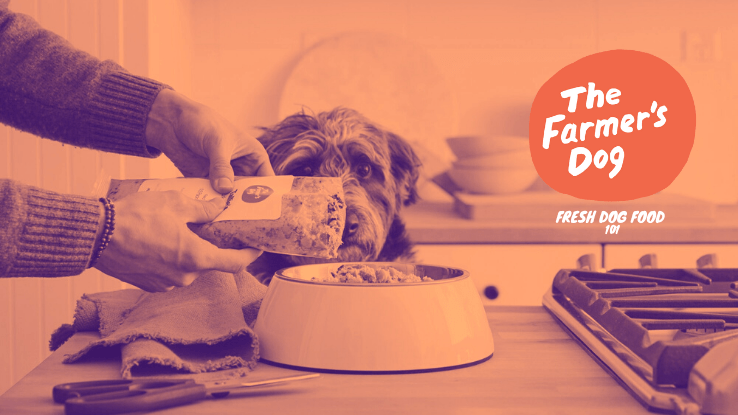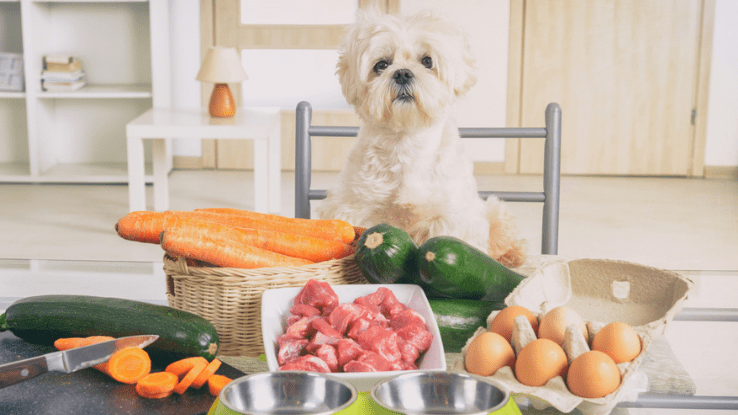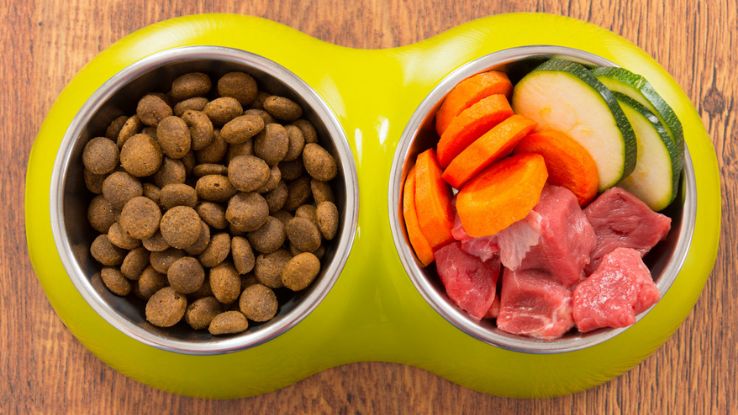Feeding Raw Food to Dogs How Often Switch Proteins

Dog food has come a long way in the past few years — just ask The Farmer's Dog. In fact, it seems like new canine diet options are popping up every day. One of the latest trends? Replacing kibble with fresh food made from human-grade, high-quality ingredients. Without a doubt, we all want to provide our pets with the best, but a DIY approach to the fresh-food diet can be time-consuming and can miss important nutritional elements. And that's where subscription services like The Farmer's Dog come in.
Made with the finest ingredients and shipped right to your door, these pre-packaged, tailor-made meals are enticing — but is feeding your dog human-grade food a good idea? And, for those on a budget, is it worth the extra cost? Luckily for you, we're delving into all things dog food. Bon(e) appetit!

Have you ever looked at a scoop of kibble and wondered, "Is this really tasty?" and, perhaps more importantly, "Is it the best for my dog's health and well-being?" You're not alone. These days, you'll find plenty of delectable dog food recipes online; while that might sound like a great dry food alternative, making homemade meals for your pooch may not be something you've got time for each week. The Farmer's Dog realized this issue, too.
Subscription services, like The Farmer's Dog have become the Blue Apron for dogs. Much like a HelloFresh-type service, The Farmer's Dog delivers pre-selected meals right to your doorstep on a weekly basis. When you sign up, the service's site will prompt you with a few questions, so that the chefs over at Farmer's Dog can serve up the best meals for your pooch based on their age, breed, weight, activity level and unique sensitivities or allergies.
Each weekly box consists of meals made from human-grade ingredients, packed with the highest level of natural nutrients. While the ingredients tend to be pretty simple, that may be for the best. Not to mention, they're carefully selected by board-certified veterinary nutritionists so that your pet has the most-balanced diet possible.
While The Farmer's Dog tends to be among the top tier of fresh pet food subscription services, a few other highly rated companies have followed in their footsteps, including Spot and Tango, Nom Nom, Pet Plate, and Ollie.
The Pros: The Farmer's Dog Ingredients

Considering the natural ingredients used by The Farmer's Dog and other well-received dog food delivery services, it's clear that the health benefits of fresh meals are the most appealing part of switching from kibble to something new. For starters, by eliminating the processed ingredients found in many kibbles, fresh food tends to be a lot easier on a dog's digestive system, which results in more energy. Some dog owners have also reported that their pets enjoyed softer, shinier coats, improved eyesight and stronger immune systems.
Not to mention, there's a certain comfort in knowing exactly what's in the food you feed your best buddy on a regular basis. For some dog owners, the fresh food route has even alleviated their pet's allergies or, in the long-term, reduced the number of pricier vet bills since their dog is generally in better health. Just keep in mind that it's important to run any potential dietary changes by your dog's vet first; changing a dog's diet too quickly can result in digestive problems.
The Cons: The Farmer's Dog Cost

The price of the average fresh pet food subscription service alone may be a dealbreaker for some dog owners. After all, there's a reason that human food tends to cost more than dog food — fresh, high-quality ingredients, while nutritious, can be expensive. Plus, there's all that meal prep to consider. So, how much does it cost to get your dog started on a fresh food diet?
The answer may vary depending on the service you choose and your dog's size. Little dogs will have an obvious leg-up; smaller portions cost less across the board. The Farmer's Dog, for example, has plans that start at as little as $2 per day (with free shipping!), but each dog's plan price also depends on their weight, activity, breed and age, too.
If your dog is on the larger end of the spectrum, maintaining their daily diet through a fresh-food service can easily cost hundreds of dollars a month. If you can afford the expense, that's great! However, if it would put a strain on your financial wellness to opt into such a subscription, it's worth getting some quotes before jumping in.
Additionally, you should make sure you have plenty of room to spare in the fridge or freezer. Since most of these dog food companies don't use preservatives, you'll need to store your dog's food the same way you store your own.
Fresh Food vs. Kibble

The great kibble debate continues! While kibble proponents claim the dry feed has plenty of benefits — less risk of containing bacteria, a longer shelf life and the ability to promote healthier teeth and gums — those on the other side of the fence, such as Farmer's Dog fans, point out that while kibble may be USDA regulated, many brands just meet the minimum possible nutritional requirements. Additionally, some kibble brands go heavy on carbs. And most rely on preservatives to prevent the meat components from spoiling.
With all these considerations in mind, it's probably no surprise that a fresh-food diet is going to be a lot better for your dog in the long run than the cheapest kibble on offer in the dog food aisle. But, realistically, not every dog owner will be able to afford the price tag that comes with maintaining a premium fresh-food subscription.
So, what's a conflicted pawrent to do? The key is to keep in mind that not all kibbles are created equal. For starters, if you've decided it's time to level up your dog's kibble game, make sure that you look for a brand that lists a protein of some sort as the first ingredient. This will help you avoid kibble packed with grains and cheap additives, which can often cause skin irritation and other health-related issues.
Wellness Complete Health, for example, is formulated with premium ingredients — there's no GMOs, artificial preservatives, or meat by-products. It's also comforting to see that Wellness is about as transparent as it gets when it comes to their offerings; just select one of the choices on their nutritional information page to find out exactly what's in it. Of course, there are plenty of other top-tier kibbles to choose from. Just make sure to do your research and consult your dog's vet.
Other Dietary Alternatives for Dogs

Looking for a compromise that lies somewhere between fresh food from The Farmer's Dog and pet store kibble? You may want to talk to your vet about incorporating more wet food into your dog's diet. The best choices among canned dog foods contain more protein and moisture than kibble, all while sticking with top-of-the-line ingredients. Much like kibble, the key is to remember that some wet food brands will be a lot higher quality than others. This is where consulting either your vet or even an online vet can help you select the right food for your dog.
Make sure you narrow down your options to those that include protein as the first ingredient, supplemented with those designed to give your dog the nutrients they need. Dog Food Advisor has a list of great candidates to check out to help you get started. Not to mention, adding probiotics to your dog's regimen, from goat's milk to pumpkin puree, can aid with digestion, all while giving your pooch something tasty to look forward to alongside their bowl of kibble.
Source: https://www.askmoney.com/budgeting/farmers-dog-fresh-food-worth-cost?utm_content=params%3Ao%3D1465803%26ad%3DdirN%26qo%3DserpIndex&ueid=f8953d5f-729c-41e8-92ad-82aaf1d9b6a2
0 Response to "Feeding Raw Food to Dogs How Often Switch Proteins"
Post a Comment